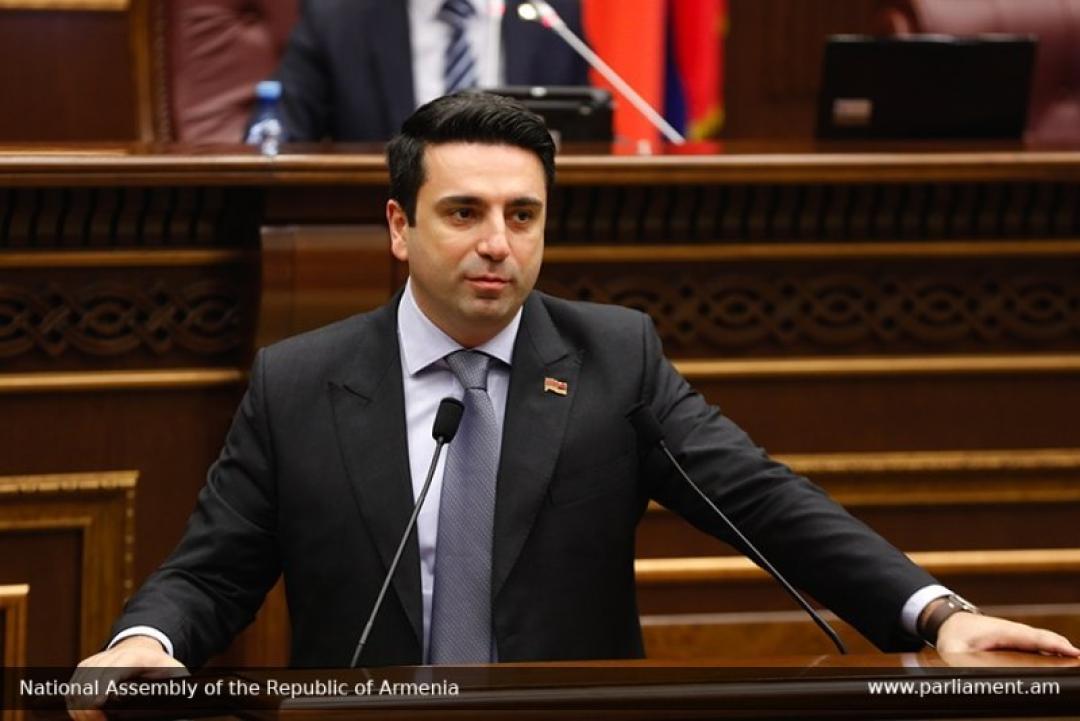
Armenian Speaker Simonyan on Nagorno-Karabakh, CIS, BRICS, and CSTO Ties

On September 9, Alen Simonyan, the Speaker of the National Assembly of Armenia, announced that [de-facto] official representatives of [the separatist] Nagorno-Karabakh no longer exist.
He argued that the Armenia-NKR Inter-Parliamentary Commission should be dissolved due to the lack of a legal basis for its existence. "There are no more officials representing Nagorno-Karabakh," Simonyan said, emphasizing that no one with such status is left in Armenia. Simonyan explained that Nagorno-Karabakh, as represented by its authorities, dissolved itself in September 2023. He remarked, "Relations are only possible when there are two sides. Personally, I can't convene a session with the participation of some obscure persons." He was also aware of Araik Harutyunyan’s resignation from the post of Artsakh President, which he discussed with journalists, noting that Harutyunyan had warned of significant pressure on him."
Regarding the dissolution of Nagorno-Karabakh, Simonyan stated that the Armenian authorities were informed of the decision at the last moment, and no discussion or consultation with them occurred beforehand. He emphasized that Armenia's request to remove references to Armenia from the text of the dissolution document was made, as it was not reflective of reality. Simonyan also defended the current Armenian government's actions, asserting that it has done more for Nagorno-Karabakh than previous authorities. He criticized those who accuse the current government of failing to support Nagorno-Karabakh, pointing out that the government was working within a challenging context following the 2021 elections.
On the broader geopolitical context, Simonyan discussed Armenia’s participation in the Commonwealth of Independent States (CIS) and BRICS. He stated that the CIS remains important for Armenia, as it is based on the Almaty Declaration, which underpins Armenia's negotiation strategies. Regarding BRICS, he noted that Armenia's involvement is based on economic interests and does not contradict European integration efforts.
Simonyan also addressed the issue of prisoners of war (POWs), stating that negotiations are ongoing and that Armenia expects Russia and Azerbaijan to uphold their commitments under the November 9 statement. He questioned whether Armenia's participation in COP29, which is organized by the UN rather than Azerbaijan, should be linked to a peace agreement or the return of prisoners. Armenian Parliament Speaker Alen Simonyan discussed various issues related to prisoners of war and the situation in Nagorno-Karabakh. Simonyan emphasized that Gevorg Sujyan, who is currently in captivity in Azerbaijan, is not a military person and should not be accused of any military-related offenses. Sujyan, who is the founding president of the New Armenia Homeland-Diaspora charitable NGO, along with David Davtyan, was captured in the Lachin corridor area in November 2020. Both were sentenced to 15 years in prison on charges including illegal possession of weapons and espionage. Simonyan expressed concern over Azerbaijan's handling of the prisoner issue, noting that Azerbaijan's behavior has been extremely negative. He urged that if dialogue between the Armenian and Azerbaijani parliaments is to be effective, Azerbaijan should expedite the return of Armenian prisoners. Currently, Armenia has 23 prisoners in Azerbaijan, including 11 military and political leaders and others captured at different times.
Regarding the Prague Agreement, Simonyan affirmed Armenia's readiness to sign a document based on this agreement, which is seen as a critical safeguard for Armenia's sovereignty and security. He described the agreement as a victory for Armenia and emphasized that the country is prepared to formalize any document that establishes its borders.
Simonyan also commented on Russia's stance on Nagorno-Karabakh, criticizing Russia for its handling of the conflict. He suggested that Russia's goal was to leave the unresolved conflict as a burden for Armenia, using Azerbaijan as a tool against Armenia while abandoning its allied obligations.
Alen Simonyan also stated that the potential transfer of future communications between Azerbaijan and Nakhchivan through Syunik to a private company would not infringe upon Armenia's sovereignty. Simonyan explained that all aspects of this arrangement are currently being discussed. He noted that there is precedent for delegating such functions to an organization and assured that if such a transfer occurs, it would be regulated in accordance with Armenian legislation. As an example, he cited the presence of Russian border guards along Armenia’s borders with Iran and Türkiye, suggesting that this experience provides a framework for consideration. Simonyan also emphasized that no decisions have yet been made regarding this matter.
Finally, Simonyan mentioned that a decision to withdraw from the Collective Security Treaty Organization (CSTO) is possible. He criticized threats from Russian officials, asserting that Armenia should not be coerced through intimidation. He also rejected accusations of an anti-Russian campaign in Armenia, emphasizing that Armenia's resistance to aggression should not be viewed as hostility.
See Also


Mirzoyan Meets US Deputy Assistant Secretary Joshua Huck

Azerbaijani President Holds Talks with UAE and German Business Delegations on Economic Cooperation

Grigoryan Confirms Armenia’s Readiness to Dissolve OSCE Minsk Group Upon Peace Treaty Signing

Azerbaijani Official Warns of Ecological Risks to Caspian Sea, Similar to Lake Urmia and Aral Sea

